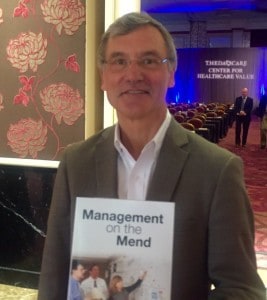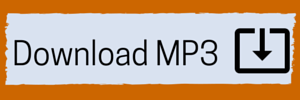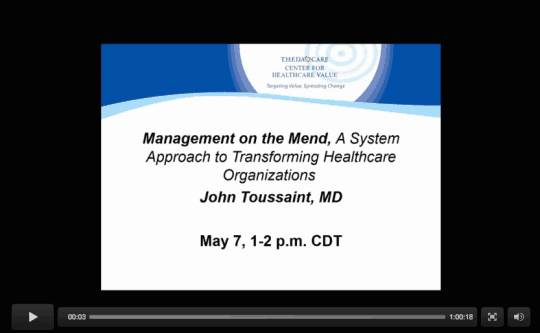
Joining me once again on the podcast today is John Toussaint, MD, the founder and CEO of the ThedaCare Center for Healthcare Value. We're talking about his latest book, Management on the Mend (read my blog post about my first thoughts about the book).
John wrote this new book to document “core elements of successful Lean transformations” that he's seen, not just at ThedaCare, but at other organizations around the world. The book outlines a “transformation model” that can be used to structure a Lean transformation, while John admits there's not just one prescription or framework that could work.
Streaming Player (Run Time 43:27)


In the podcast, we discuss topics including:
- How often does John find leaders who are willing to admit they need to be “mended” or that they need to change their approach and model Lean behaviors from the top?
- Why does the Affordable Care Act help get leaders interested in Lean?
- How do values and principles drive systems and Lean improvement? Read more about the Shingo Model that he mentions.
- Why is focusing on “ROI” problematic for a Lean transformation?
- How can key support departments, like finance, and HR, become partners in the transformation efforts?
- What role does the health system Board need to play to drive Lean transformation?
- How can manufacturing leaders get involved as possible Board members?
- Is it easier for John, as a former hospital CEO, to influence other CEOs?
- How does John see prices in healthcare becoming more standardized or transparent to patients and payers? Read more about “reference pricing,” as mentioned by John.
John was previously a guest for episodes #184, #159, #146, #72, #62, and #54 going back to 2008. His previous books, which I highly recommend, are On the Mend and the follow up Potent Medicine, both are Shingo Research Award recipients.
You can buy the book through the ThedaCare Center or as a Kindle book via Amazon.
For a link to this episode, refer people to www.leanblog.org/225.
For earlier episodes of my podcast, visit the main Podcast page, which includes information on how to subscribe via RSS or via Apple Podcasts. You can also subscribe and listen via Stitcher.
Partial Transcript:
Mark: You've got a new book out and it's always fun talking about what you're doing and what you've been writing about, so maybe we'll just jump in and talk about the new book “Management on the Mend” as a follow up to your previous books. Tell the listeners how the book came to be.
John: We've been studying a number of organizations around North America. I spend a lot of time visiting organizations and what we have been finding is that there's some core elements, some core characteristics of successful Lean transformations across the industry.
What we wanted to do is write a book about the framework of the successful Lean transformations and we're really talking about the whole transformation here, not just one component of it. This book is the compendium of knowledge from the center, from my organization, the ThedaCare Center for Healthcare Value, as we know it today.
Mark: How do you gauge successful? How would you describe something you would consider to be, a successful Lean transformation?
John: As you know, Lean is about getting results. The only reason that you would go through the change process required to transform your entire organization, is to deliver better results. What we were looking for is, organizations that really had significantly better results, and then how they had…what they had done from the standpoint of their Lean journey, to achieve those.
For example, the Palo Alto Medical Foundation used their redesign work, to actually become the number one set of clinic in California, related to customer quality and service. That was rated by Consumer Reports, which has been spending a lot of time throughout the country, building Consumer Reports for healthcare clinics. We were looking at where's the world class performance going on, and then studying those companies.
Mark: As you say in the book, this is a balance scorecard if you will, of measures around safety, quality, and access, and cost across the board results. A lot of people often focus on looking for cost reduction, and clearly there's more to it than that, right?
John: Yeah, I think we still have a lot of site visitors. The one thing I tell them is, “If you're coming to try to learn this methodology, so that you can take $200 million out of your cost structure, you're probably not going to be successful.” Because, as we all know, this is about redesigning processes to deliver better value, which means taking waste out of the process of care.
You should see improved quality, reduced costs, and improved staff engagement. All three of those things are critically important from the standpoint of measuring success. If you're just looking for cost reduction, this isn't the methodology for you.
Videos with Dr. Toussaint:
Watch a webinar with Dr. Toussaint discussing the transformation model from his book.

A talk John gave in 2009:
Feedback & Comments:
If you have feedback on the podcast, or any questions for me or my guests, you can email me at leanpodcast@gmail.com or you can call and leave a voicemail by calling the “Lean Line” at (817) 993-0630 or contact me via Skype id “mgraban”. Please give your location and your first name. Any comments (email or voicemail) might be used in follow ups to the podcast.
What do you think? Please scroll down (or click) to post a comment. Or please share the post with your thoughts on LinkedIn – and follow me or connect with me there.
Did you like this post? Make sure you don't miss a post or podcast — Subscribe to get notified about posts via email daily or weekly.
Check out my latest book, The Mistakes That Make Us: Cultivating a Culture of Learning and Innovation:










Great interview Mark. Very powerful principles and the accompanying videos are excellent
[…] John’s most recent book is Management on the Mend, which we discussed in episode #225. […]